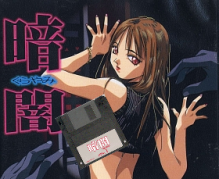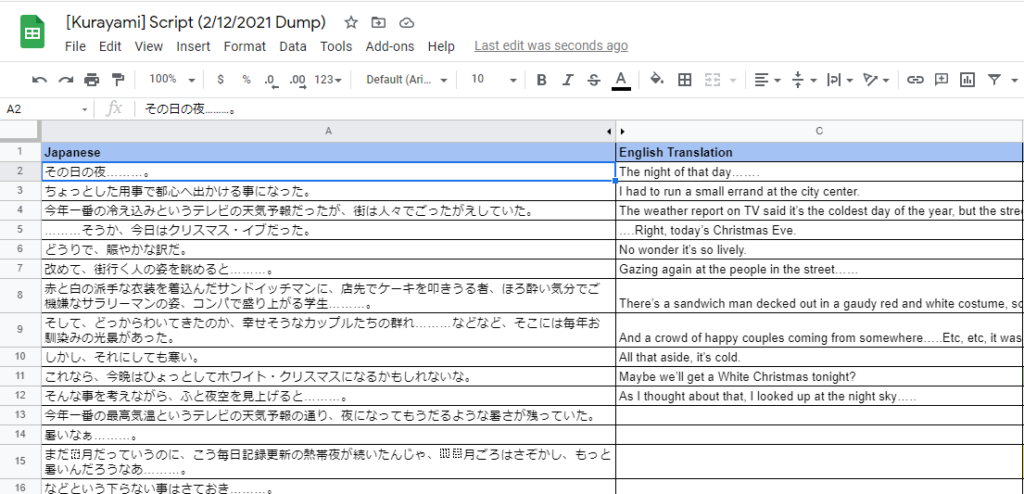
I figured this would be a good time to write a brief primer on the challenges faced in translating Kurayami — or at least those that we’re aware of right now! — in order to give a better sense of the scope of this project and maybe help out some others about to embark on a large-scale translation project of their own!
In general, I will be separating this article into two parts: technical challenges and translation challenges. Often times these two issues overlap, but those cases will be noted down below.
If you have any questions at all about how we’ve overcome these challenges (if we did…) or about why we took the approach at we did, feel free to comment down below! I’d love to hear from you.
With that out of the way, let’s get this started!

Technical Challenges
Version
One of the biggest initial challenges was making the decision of proceeding with the Windows95 port of the game of translating the original PC-98 version. While it would be ideal to create an “agnostic patch” that can add the English translations to either version, unfortunately that kind of additional work is currently beyond the scope of the project.
Ultimately I decided to go with the Windows version because 1) it still runs natively on Windows 10 with minor modifications (e.g., changing compatibility settings to run in 256 color mode); and 2) I know a lot more about the Windows infrastructure.
Game Data
When Melody created their Windows port of the game, it’s not like they ever expected people to be digging through the files and going hog wild. Nor did they want them to, apparently.
The “game” consists of two files: [Eve.exe] and [EVE.PCK].
[Eve.exe] is essentially a very small program that handles to saving, loading, screen sizing, and other OS-side matters and then loads up the [EVE.PCK] file to play the actual game. All scripting, pictures, music, and dialogue are contained in this file. Though just a hunch, somethings tells me that Melody developed this in-house to speed along ports. Or it’s an off-the-shelf solution. I can’t find any information about this [Eve.exe] program.
Both of these files are also formatted in a different manner, meaning that there’s no “one-size-fits-all” solution for translating the text. Fortunately there are only a few menus that need to be translated in the [Eve.exe] file and I’ve already managed to figure out the encoding, but it may need to handled manually.
No Tools
It probably goes without saying, but there are no ready-made tools that can be used to export the text from this game, much less import it once done. While RHDN is a fantastic resource for hacking and translating old console-based video games, there’s relatively little in the way of utilities or reference materials that can be directly applied to PC games.
This meant that all tools used in translating Kurayami (script dumping, calculating and adjusting pointer locations, and script insertion) had to be written from scratch. The tools will be made available on GitHub in case they wind up being useful to any other translation projects, though I can’t say for sure how useful they’ll be for other games, except possibly for other Melody games.

Translation Challenges
Volume of Text
Probably the biggest translation challenge facing this project is, of course, the sheer volume of text that needs to be translated. It’s easy to imagine and conceptualize that visual novel games “have a lot of text,” but staring directly at 18,783 rows filled with untranslated dialogue is another story entirely. And that’s not accounting for the fact that there are other menus, system dialogue boxes, and even missed story dialogue elsewhere in the file.
Translating this will be no small feat, especially when you consider that video game translation often involves working out of order and with no context. Though definitely doable, this will be a time intensive process.
Character Names — Mari, Mari, and Mari
The game does an interesting thing in that each of the names of all three women are homonyms, though they are not the same.
- まり = Mari (hiragana)
- 麻梨 = Mari (kanji)
- マリ = Mari (katakana)
Rendering this difference in a natural-sounding English translation is incredibly difficult, if even possible at all. Essentially your options are to change the English spelling to mimic this naming pattern (e.g., Mary, Mari, Marie), the style of writing (e.g., Mari, MARI, mari), or accept that this is a nuance that will simply be lost to the English reader as a matter of necessity.
One option I’ve explored is to offer up multiple patches, allowing the end user to choose which format they let best. However, we’re still a long ways out from a proper translation in the first place, so it’s probably a bit too early for that right now — assuming it’s even feasible in the first place.
Cultural Nuance
Kurayami is very much a creature of its time (mid-90s Japan) and many of the references in the story are based firmly in that bubble. This includes references to pop culture and slang in use at the time, current technologies, and more. But even more importantly to the matter of translation are all the references to concepts unique to Japanese (or East Asian) cultures, including honorifics, differences in speaking style, and pronoun use.
While I’m certain that there’s a (not insignificant) subset of fans who want to retain the nuance of one of the girls referring to you as “Mamoru-sempai,” doing this in a matter that 1) does not interrupt the flow of the story, and 2) does not require the player to already have a basic understanding of Japanese language and nuance is a challenge in its own right.

In Closing
So what does this all mean? Well, that a lot of exciting challenges await, really! And that I look forward to seeing not only how we overcome them, but sharing the successes and failures with you as we move ever closer toward a successful release of this interesting game!
If you’re interested in this game, or in embarking on your own VN translation project on PC/PC98, I’d love to hear from you! It’s a relatively niche community, so it’d be great to share notes.
I like the aesthetics of pc98 games a lot. This one seems to be a very interesting project. I wish you the best!
Thanks so much for the positive vibes!